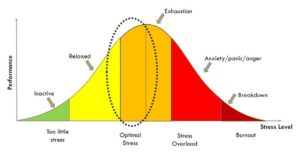Note: This article was originally published as part of the Q3 2019 issue of the WFCC Newsletter and is reproduced here with permission. See original: http://www.sahilnawab.com/wfcc/q3_2019.pdf
Dealing with stress is an integral part of the modern human experience. We all struggle with health-related issues, financial difficulties, family disagreements, and many others. There are a number of negative effects associated with high levels of stress, from headaches and depression to even physical health issues and increased recovery times. Therefore, it is crucial to have healthy and productive coping mechanisms to manage our stress.
In a brilliant TED Ed video, Massimo Pigliucci discusses the Stoic philosophy and its origins in the teachings of Zeno of Cyprus when he became shipwrecked off the coast of Athens and lost all of his wealth and possessions.
While today the term stoic has developed its own meaning as an adjective to describe someone who endures difficulties while remaining calm and collected or someone who rarely shows emotion in the face of adversity. However, the original philosophy goes much deeper, and is in fact much more applicable in our daily lives to help recognize and handle stress.
“While we may not always have control over the events affecting us, we can have control over how we approach things.”
This statement concisely summarizes the Stoic philosophy. But while this captures the essence of Stoicism, how can we actually apply it to our lives?
Pigliucci describes the four core tenets of Stoicism that we can follow:
- Practical wisdom — the ability to navigate complex situations in a logical, informed, and calm manner;
- Temperance — the exercise of self-restraint and moderation in all aspects of life;
- Justice — treating others with fairness even when they have done wrong; and
- Courage — not just in extraordinary circumstances, but in facing daily challenges with clarity and integrity.
Often people conflate Stoicism with having a nonchalant attitude towards life. However, that’s an incorrect characterization. Stoicism is not about discounting or not caring about issues, but rather it is about understanding that these issues should not cause unhealthy levels of stress. Rather, we should focus our efforts on matters which we can actually address.
In fact, a nonchalant attitude can be quite counterproductive. Stress is an effective motivator for action. Modern psychologists describe this through the stress-productivity curve, or more formally known as the Yerkes-Dodson Law.
Fig. 1 – Stress vs. performance curve, adapted from the Yerkes-Dodson Law (Image: Heath, 2019) (PS. I first saw an image like this in a class presentation HU3900_D2019, but since have not been able to find the original source. I searched for a similar image, and found this here: https://slideplayer.com/slide/16338179/)
Perhaps this response arises from evolutionary pressure. Stress may have been an action-motivator to our evolutionary ancestors. During primitive life, actions were likely conducted over much larger timescales, especially given the exponential increase in pace in our modern lives. Consequently, stress arising from situations such as limited food availability or lack of social contact, may have pushed early humans to act, potentially providing an evolutionary advantage to a stress response.
Therefore, in a well-managed manner, stress provides an excellent way to push ourselves to do better — just the right amount can make us more productive and compel ourselves to address the challenges that we face.
First, know and recognize stressors before they become stressful. If you can recognize that certain matters are out of your control, you can begin to address those that are /in/ your control. That is the first step in being able to act calmly to actually address those factors and reduce the stress.
By incorporating elements of Stoicism into your own personal philosophy, you can become self aware and more conscious of how external events affect your emotions and mental state. It then becomes much easier to deal with those changes and develop healthier stress coping mechanisms. Let me end with an interesting thought to ponder: “Suffering stems not from the events in our lives, but from our judgements about them.” — Epictetus
Dossier
“The Philosophy of Stoicism,” by Massimo Pigliucci, June 19, 2017. https://ed.ted.com/lessons/the-philosophy-of-stoicism-massimo-pigliucci. This is an animated video lesson explaining the history and general philosophy of Stoicism in an entertaining story format.
“Are You Too Stressed to Be Productive? Or Not Stressed Enough?” By Francesca Gino, April 14, 2016. https://hbr.org/2016/04/are-you-too-stressed-to-be-productive-or-not-stressed-enough. This is an article from the Harvard Business Review that provides some practical advice to improve your performance from related stress.

